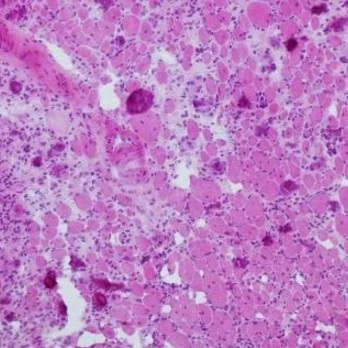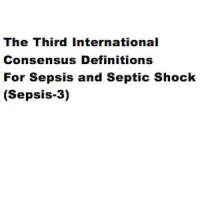Researchers may have uncovered the reason why many patients diagnosed with sepsis suffer debilitating muscle impairment long-term after recovery. Results of their study, published in Nature Communications, suggest that a therapeutic approach based on mesenchymal stem cell transplantation may be effective in restoring muscle capacity.
Sepsis is an inflammatory response by the entire body to severe infection. Surviving patients can suffer from severe impairment, particularly at neurological and muscular level, which can be highly debilitating and can prevent survivors from leading a normal active life in the long term.
For this study, Prof. Fabrice Chrétien, from the Institut Pasteur, and colleagues investigated the consequences of sepsis on muscle stem cells — known as satellite cells — which develop into muscles, particularly in the limbs. They observed a significant decrease in the mitochondrial mass of these stem cells in mouse models. Mitochondria are organelles that produce the energy-rich ATP molecules which are required for all chemical reactions. Following sepsis, the few remaining mitochondria provide satellite cells with just enough energy for their basic survival, but not enough for dividing and differentiating into muscle cells when required for muscle growth, repair and maintenance. This damage prevents the organism from fully restoring muscle function, hence the persistent muscle impairment observed in patients, according to the researchers.
This research led the investigators to explore the possibility of using mesenchymal stem cell transplantation as a potential avenue for therapy. Mesenchymal stem cells can be easily cultured in the laboratory and are known for their immunomodulatory properties, which makes them an excellent option for cell therapy transplants that aim to repair degenerative or traumatic lesions. Using a mouse model, Prof. Chrétien and his team demonstrated that an intramuscular mesenchymal stem cell transplant carried out after septic shock resulted in a drop in the level of overall inflammation and related symptoms: fever, atony (loss of muscle tone), circulation of cytokines, inflammatory molecules, etc.
A histological analysis conducted after the transplant revealed that the mesenchymal stem cells provided support for the damaged satellite cells without actually replacing them. The mesenchymal stem cells were then eliminated by the organism, with the transplant having successfully repaired the mitochondrial damage and fully restored the metabolic and division capability of the satellite cells.
Encouraged by the results, Prof. Chrétien's team is preparing to continue their investigation in humans. The first stage of their research, which should confirm whether the same tissue damage is observed in human patients, is due to begin shortly.
Source and image credit: Institut Pasteur
Sepsis is an inflammatory response by the entire body to severe infection. Surviving patients can suffer from severe impairment, particularly at neurological and muscular level, which can be highly debilitating and can prevent survivors from leading a normal active life in the long term.
For this study, Prof. Fabrice Chrétien, from the Institut Pasteur, and colleagues investigated the consequences of sepsis on muscle stem cells — known as satellite cells — which develop into muscles, particularly in the limbs. They observed a significant decrease in the mitochondrial mass of these stem cells in mouse models. Mitochondria are organelles that produce the energy-rich ATP molecules which are required for all chemical reactions. Following sepsis, the few remaining mitochondria provide satellite cells with just enough energy for their basic survival, but not enough for dividing and differentiating into muscle cells when required for muscle growth, repair and maintenance. This damage prevents the organism from fully restoring muscle function, hence the persistent muscle impairment observed in patients, according to the researchers.
This research led the investigators to explore the possibility of using mesenchymal stem cell transplantation as a potential avenue for therapy. Mesenchymal stem cells can be easily cultured in the laboratory and are known for their immunomodulatory properties, which makes them an excellent option for cell therapy transplants that aim to repair degenerative or traumatic lesions. Using a mouse model, Prof. Chrétien and his team demonstrated that an intramuscular mesenchymal stem cell transplant carried out after septic shock resulted in a drop in the level of overall inflammation and related symptoms: fever, atony (loss of muscle tone), circulation of cytokines, inflammatory molecules, etc.
A histological analysis conducted after the transplant revealed that the mesenchymal stem cells provided support for the damaged satellite cells without actually replacing them. The mesenchymal stem cells were then eliminated by the organism, with the transplant having successfully repaired the mitochondrial damage and fully restored the metabolic and division capability of the satellite cells.
Encouraged by the results, Prof. Chrétien's team is preparing to continue their investigation in humans. The first stage of their research, which should confirm whether the same tissue damage is observed in human patients, is due to begin shortly.
Source and image credit: Institut Pasteur
References:
Chrétien F et al. (2015) Sepsis induces long-term metabolic and mitochondrial muscle stem cell dysfunction amenable by mesenchymal stem cell therapy. Nature Communications, December 15, 2015; 6: 10145 DOI:
10.1038/ncomms10145
Latest Articles
healthmanagement, sepsis, mesenchymal stem cells, muscle tissue, muscle impairment, institute pasteur
Researchers may have uncovered the reason why many patients diagnosed with sepsis suffer debilitating muscle impairment long-term after recovery. Their study suggests that a therapeutic approach based on mesenchymal stem cell transplantation may be effect










